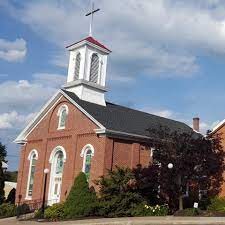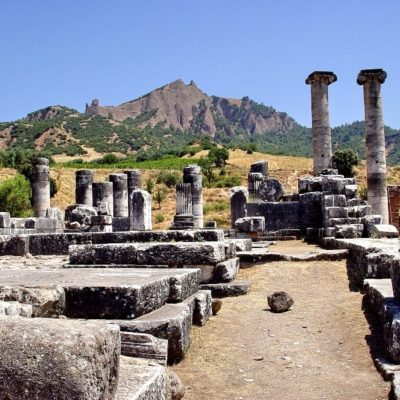Church of the United Brethren in Christ

The Church of the United Brethren in Christ is an evangelical Christian Protestant denomination which follows the Episcopal structure and the Arminian theology. It is the first American denomination that began in the United States that was not uprooted from Europe. It is a member of the National Council of Churches.
It is a conservative body of Christians whose members believe in the Trinity, Deity, humanity and atonement of Jesus Christ. They believe the Bible consists of the Old and the New Testaments combined together to express the complete and inspired Word of God.
The first name of the Church of the United Brethren in Christ was the United Brethren Church. They officially adopted their name the Church of the United Brethren in Christ to avoid confusion with the Moravian church which is also known as the Unity of the Brethren.
The founder of the Church of the United Brethren in Christ was Martin Boehm in Lancaster, Pennsylvania in 1767. Their Confession of Faith was adopted in 1815 and to date has never been changed. Their Constitution was adopted in 1841. They have many membership standards which are laid out in their Constitution.
United Brethren Confession of Faith
The Triune God
In the name of God, we declare and confess before men that we believe in the only true God, the Father, the Son, and the Holy Ghost; that these three are one–the Father in the Son, the Son in the Father, and the Holy Ghost equal in essence or being with both; that this triune God created the heavens and the earth and all that in them is, visible as well as invisible, and furthermore sustains, governs, protects, and supports the same.
Jesus Christ, the Son
We believe in Jesus Christ; that He is very God and man; that He became incarnate by the power of the Holy Ghost in the Virgin Mary and was born of her; that He is the Savior and Mediator of the whole human race, if they with full faith in Him accept the grace proffered in Jesus; that this Jesus suffered and died on the cross for us, was buried, arose again on the third day, ascended into heaven, and sitteth on the right hand of God to intercede for us; and that He shall come again at the last day to judge the quick and the dead.
The Holy Spirit, Comforter and Guide
We believe in the Holy Ghost; that He is equal in being with the Father and the Son, and that He comforts the faithful, and guides them into all truth.
The Church
We believe in a holy Christian church, the communion of saints, the resurrection of the body, and life everlasting.
The Holy Bible and Salvation
We believe that the Holy Bible, Old and New Testaments, is the Word of God; that it contains the only true way to our salvation; that every true Christian is bound to acknowledge and receive it with the influence of the Spirit of God as the only rule and guide; and that without faith in Jesus Christ, true repentance, forgiveness of sins, and following after Christ, no one can be a true Christian.
The Salvation Message
We also believe that what is contained in the Holy Scriptures, to wit: the fall in Adam and redemption through Jesus Christ, shall be preached throughout the world.
The Christian Ordinances
We believe that the ordinances, viz. baptism and the remembrance of the sufferings and death of our Lord Jesus Christ, are to be in use and practiced by all Christian societies; and that it is incumbent on all the children of God particularly to practice them; but the manner in which ought always to be left to the judgment and understanding of every individual. Also, the example of washing feet is left to the judgment of every one to practice or not; but it is not becoming of any of our preachers or members to traduce any of their brethren whose judgment and understanding in these respects is different from their own, either in public or in private. Whosoever shall make himself guilty in this respect shall be considered a traducer of his brethren, and shall be answerable for the same.
The Church of the United Brethren in Christ had a controversy in 1889 over membership in secret societies, like the Freemasons, which split the United Brethren. Part of the division merged with the Evangelical Church in 1949 and formed a new denomination which became the Evangelical United Brethren Church. Then another merger was made in 1968 with the Methodist Church which formed the United Methodist Church.
The headquarters for the Church of the United Brethren in Christ is located in Huntington, Indiana. They own the Huntington University which is a Christian liberal arts University also located in Huntington, Indiana.
History
The United Brethren in Christ, which later became the Church of the United Brethren in Christ, was part of the Reformed movement in 1767. They met in a barn in Lancaster, Pennsylvania. Martin Boehm and William Otterbein, German Reformed pastors, became the first two bishops. The first General Conference happened in 1800. The United Brethren was the first denomination to actually start in the United States. The Confession of Faith was written by William Otterbein in 1789 and a similar Confession of Faith was then adopted in 1815. They adopted their Constitution in 1841.
The Church of the United Brethren in Christ was against slavery in the Civil War. The Church would not allow any slave owners to remain as members of the United Brethren Church in 1837. Church membership grew and expanded into the western United States, but because of the ruling of not allowing slave owners to remain as members, the southern states did not prosper. The United Brethren Church growth led to the establishment of six Bishops by 1889. The leadership wanted to make three changes; to give the local conferences representation at their General Conference, to allow United Brethren members to hold membership in secret societies like the Freemasons and to allow laymen to serve as delegates to the General Conference. The majority of the leadership agreed with these changes, but the minority believed the changes violated their Constitution. Bishop Milton Wright disagreed with the actions of the majority and he led other delegates out of the meeting. They withdrew from the denomination and Wright was established their first Bishop.
This made two groups worshiping under the name Church of the United Brethren in Christ in 1946. The larger group merged with the Evangelical Association to form the Evangelical United Brethren Church. They then merged with the Methodist Church in 1968 to form the United Methodist church. The minority who were organized under the leadership of the Bishop Milton Wright eventually adopted the name of The Church of the United Brethren in Christ. The Church of the United Brethren in Christ did accept two of the changes that had led to the division in 1889. They adopted the laymen serving as delegates to the General Conference and the giving the local conferences representation at their General Conference.
Martin Boehm was born in 1725 just south of Lancaster Pennsylvania. Martin Boehm was the son of a Dutchman. His grandfather was a Swiss Mennonite who came from Germany. Martin Boehm became a minister in 1756 at a Mennonite Church in Byerland, Pennsylvania.
Back then, a new pastor was selected from the congregation and nominated for the position. The chosen person had to select one of the Bibles that were laid in front of them. There would only be one Bible that contained a paper with Proverbs 16:33 written on it. “The lot is cast into the lap; but the whole disposing thereof is of the LORD.” (Proverbs 16:33).
Martin Boehm selected the Bible with the verse in it and that made him a pastor. The Mennonite Bishop of the church died five years later. Again Martin Boehm was chosen to become the new bishop in the same way exactly as he had become a minister.
Martin Boehm had an evangelistic passion and associated with Christians from other denominations. This evangelism mentality disturbed the Mennonites leaders and they asked Boehm to repent and turn from his evangelistic ways. William Boehm refused and was excommunicated in 1775. He was accused of leading his people astray by associating with those outside the church and associating with people who approved of the practice of way.
Martin Boehm was a very mild, timid and humble man, yet he participated in the Great Meetings, which were three day events where whole communities would find the Holy Spirit descending in power.
On May 10, 1767 a Great Meeting was held at Long’s Barn in Lancaster, Pennsylvania and Bishop Boehm spoke. When his sermon ended, a Reformed minister named William Otterbein rose and hugged Boehm and declared “We are brethren”. The name of the denomination came from this encounter with Otterbein, and his declaration of brotherhood. Martin Boehm remained a bishop for the Church of the United Brethren in Christ until his death in 1813 at the age of 87.
William Otterbein was born in Germany in 1726 and was the son and grandson of ministers. He became a powerful and well-spoken minister.
William Otterbein went to America with five other ministers. They first stopped in Holland to examine their education, theology, personalities and most of all their preaching ability. On April 15, 1752 the five German ministers made a four month sea voyage to New York City.
William Otterbein accepted a church in Lancaster, Pennsylvania and developed a strong congregation. His main focus was on evangelism and the need for the congregation to have a more intimate walk with God.
He went to the meeting at Long’s Barn and heard the testimony given by Martin Boehm and recognized a kindred spirit. He called Martin Boehm “brother”, and they had a lifelong friendship. Together, they participated in Great Meetings and provided supervision and instruction to all who came to hear them. It was a common belief that united these people and gave the life of Christ to all who participated. These two men were responsible for converting many to Christ and transforming their lives.
In September, 1800, thirteen ministers gathered in Frederick Maryland and elected bishops to officially lead their movement which they called The Church of the United Brethren in Christ. William Otterbein remained a member of the Reformed church and also remained the pastor of the Reformed Church in Baltimore. He also served as bishop until his death in 1812 at the age of 87 for the Church of the United Brethren in Christ.
Belief
The Church of the United Brethren in Christ believes in the only true God, the Father, the Son, and the Holy Ghost. They believe they are three in one and are equal in essence. They believe the Triune God created the heavens and the earth and everything that is in them.
They believe in Jesus Christ and that He is both God and man. They believe Jesus Christ became incarnate by the power of the Holy Ghost in the Virgin Mary and was born of her. They believe Jesus Christ is the Savior and Mediator of the whole human race, as long as they with full faith in Jesus accept the grace that is offered in him. They believe Jesus suffered and died on the cross for us, that He was buried and arose again on the third day, ascended into heaven and is now sitting on the right hand of God to intercede for us. They believe Jesus Christ will come again at the last day to judge the quick and the dead.
The Church of the United Brethren in Christ believes in the Holy Ghost and that He is equal with the Father and the Son. They believe the Holy Ghost comforts the faithful, and guides them into all truth.
They believe the Holy Bible including the Old and New Testaments is the Word of God. They believe it contains the only true way to salvation. They believe every true Christian is bound to acknowledge and receive it with the influence of the Spirit of God as the only rule and guide. They believe no one can be a true Christian without faith in Jesus Christ, true repentance, forgiveness of sins, and following after Christ.
The Church of the United Brethren in Christ believes Baptism is an ordinance and should be the remembrance of the sufferings and the death of Jesus Christ. They believe all children of God have the responsibility and obligation to be baptized. They believe the washing of the feet is to be left to the judgment of every one whether to practice it or not.
Cite Article Source
MLA Style Citation:
Holstein, Joanne “Church of the United Brethren in Christ:.” Becker Bible Studies Library Jan 2006.<https://guidedbiblestudies.com/?p=2654,>.
APA Style Citation:
Holstein, Joanne (2006, January) “Church of the United Brethren in Christ:.” Becker Bible Studies Library. Retrieved from https://guidedbiblestudies.com/?p=2654,.
Chicago Style Citation:
Holstein, Joanne (2006) “Church of the United Brethren in Christ:.” Becker Bible Studies Library (January), https://guidedbiblestudies.com/?p=2654, (accessed).


